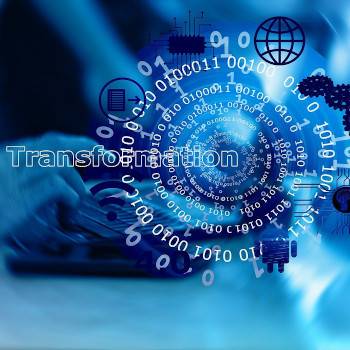
A majority of German companies do not perceive cybersecurity as an obstacle, but rather as an enabler for digitalization and business development. Because changes help to develop new business models.
Trend Micro, one of the world's leading providers of cybersecurity solutions, in collaboration with the Brandenburg Institute for Society and Security (BIGS), surveyed IT and IT security executives about their risk perception, their investment behavior and the role of IT security in their business models. Based on this data, BIGS determined connections in an empirical analysis.
Cybersecurity creates the conditions for digital transformation
Cyber attacks are the biggest business risk today. Protecting yourself from them is therefore an economic necessity. More than three quarters (76 percent) of German companies with over 250 employees consider IT security to be important for the economy. But it's no longer just about avoiding damage. Security is increasingly being perceived as an opportunity for business development. Two thirds of those surveyed (66 percent) want to advance digitalization projects by modernizing IT security. 79 percent of companies that strategically invest in security consider this to be relevant in order to develop new business models.
“The study shows that the perception of IT security has changed in key areas,” explains Dr. Tim Stuchtey, Managing Director of the Brandenburg Institute for Society and Security. “In the past, it was often seen as a brake on innovation. The majority of companies surveyed have now recognized that IT security actually creates the prerequisites for digital transformation. It opens up new business areas and can be profitably integrated into your own business model. Cybersecurity is no longer viewed as a preventer but has become an enabler.”
Strategic investments make sense
There is an increasing awareness that investments in IT security are economically profitable. 64 percent of the companies surveyed believe that security brings added value for the customer, and 59 percent already use their IT security concept for marketing purposes. Awareness of the topic is also growing among consumers. They therefore expect companies to protect customer data as best as possible. Consequently, good IT security can strengthen a brand. Conversely, inadequate security measures have a negative impact on a company's reputation. The damage caused by loss of reputation often ends up being significantly higher than the costs incurred for preventative measures.
Fundamentally, investments in cybersecurity have increased in almost all industries over the past 24 months. But how do companies go about this – more strategically or more reactively? The study shows: Anyone who has already been affected by a cyber attack or fears damage from future attacks primarily invests strategically in security. The same applies to companies that see IT security as a contribution to the value chain and added value for their customers. On the other hand, those who have no experience with cyberattacks, have low risk awareness and consider security to be less relevant for the economy are more likely to invest reactively.
Cybersecurity is a matter for decision-makers
“The experience of recent years shows that strategic investments in IT security are necessary – and pay off,” says Hannes Steiner, Vice President Germany at Trend Micro. “Cybersecurity has become a top priority. Companies are faced with the challenge of protecting their sensitive data and systems from the threats of cybercrime. The responsibility lies with both the IT and business decision-makers. Together, they must ensure that comprehensive cybersecurity measures are integrated into the ecosystem to ensure customer and partner trust and ensure business continuity.”
More at TrendMicro.com
About Trend Micro As one of the world's leading providers of IT security, Trend Micro helps create a secure world for digital data exchange. With over 30 years of security expertise, global threat research, and constant innovation, Trend Micro offers protection for businesses, government agencies, and consumers. Thanks to our XGen™ security strategy, our solutions benefit from a cross-generational combination of defense techniques optimized for leading-edge environments. Networked threat information enables better and faster protection. Optimized for cloud workloads, endpoints, email, the IIoT and networks, our connected solutions provide centralized visibility across the entire enterprise for faster threat detection and response.
